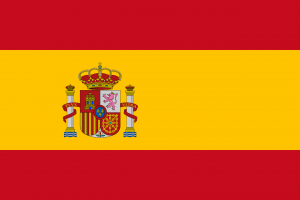Difference between revisions of "Language/Spanish/Grammar/Past-Perfect-Tense"
Enmanuel0112 (talk | contribs) (Created page with "In Spanish, we use Past Perfect Tense when we want to talk about an action in the past that happened before another action in the past. == Structure == Subject + Haber (imper...") |
m (Quick edit) |
||
| (5 intermediate revisions by 3 users not shown) | |||
| Line 1: | Line 1: | ||
[[File:Spanish-Language-PolyglotClub.png|thumb]] | |||
Hi Spanish learners,😀 | |||
In Spanish, we use Past Perfect Tense when we want to talk about an action in the past that happened before another action in the past. As you dive into this lesson, you'll gain a better understanding of how to use this tense correctly. Once you've mastered the Past Perfect Tense, you might also want to explore other aspects of [[Language/Spanish/Grammar/Plurals|Spanish plurals]], [[Language/Spanish/Grammar/Comaratives-and-Superlatives|comparatives and superlatives]], and learn how to [[Language/Spanish/Grammar/Be-Polite|be polite]] in Spanish. These additional resources will help you further improve your Spanish grammar skills. ¡Buena suerte! 😊 | |||
== Structure == | == Structure == | ||
Subject + Haber (imperfect form) + verb (past participle) + Complement | <code>Subject + Haber (imperfect form) + verb (past participle) + Complement</code> | ||
== Conjuction == | == Conjuction == | ||
If you want to say a sentence n Past Perfect Tense, you need to know how to conjugate the verb Haber. The next table shows you how you can conjugate it. | If you want to say a sentence n Past Perfect Tense, you need to know how to conjugate the verb [[Language/Spanish/Grammar/Use-of-verb-Haber|Haber]]. The next table shows you how you can conjugate it. | ||
{| class="wikitable" | {| class="wikitable" | ||
!Subject | !Subject | ||
| Line 33: | Line 35: | ||
* Nosotras habíamos ganado el trofeo antes de que vinieras (we had won the trophy before you came) | * Nosotras habíamos ganado el trofeo antes de que vinieras (we had won the trophy before you came) | ||
* Vosotros ya habíais hecho la tarea cuando la pedí (You had already done the homework when I ordered it) | * Vosotros ya habíais hecho la tarea cuando la pedí (You had already done the homework when I ordered it) | ||
==Other Lessons== | |||
* [[Language/Spanish/Grammar/How-to-Use-Be-(SER-and-ESTAR)|How to Use Be (SER and ESTAR)]] | |||
* [[Language/Spanish/Grammar/The-noun-gender|The noun gender]] | |||
* [[Language/Spanish/Grammar/El-Verboide|El Verboide]] | |||
* [[Language/Spanish/Grammar/¿Pluscuamperfecto?|¿Pluscuamperfecto?]] | |||
* [[Language/Spanish/Grammar/Be-Polite|Be Polite]] | |||
* [[Language/Spanish/Grammar/Por-vs-Para|Por vs Para]] | |||
* [[Language/Spanish/Grammar/Simple-Present-Tense|Simple Present Tense]] | |||
* [[Language/Spanish/Grammar/Interrogation-signs|Interrogation signs]] | |||
* [[Language/Spanish/Grammar/El-tiempo-presente|El tiempo presente]] | |||
<span links></span> | |||
Latest revision as of 13:11, 25 March 2023
Hi Spanish learners,😀
In Spanish, we use Past Perfect Tense when we want to talk about an action in the past that happened before another action in the past. As you dive into this lesson, you'll gain a better understanding of how to use this tense correctly. Once you've mastered the Past Perfect Tense, you might also want to explore other aspects of Spanish plurals, comparatives and superlatives, and learn how to be polite in Spanish. These additional resources will help you further improve your Spanish grammar skills. ¡Buena suerte! 😊
Structure[edit | edit source]
Subject + Haber (imperfect form) + verb (past participle) + Complement
Conjuction[edit | edit source]
If you want to say a sentence n Past Perfect Tense, you need to know how to conjugate the verb Haber. The next table shows you how you can conjugate it.
| Subject | Haber (Imperfect Form) |
|---|---|
| Yo | Había |
| Tú | Habías |
| Él/Ella/Usted | Había |
| Nosotros/Nosotras | Habíamos |
| Vosotros/Vosotras | Habíais |
| Ustedes/Ellos/Ellas | Habían |
Examples[edit | edit source]
- Yo había escrito un libro hace muchos años (I had written a book many years ago)
- Nosotras habíamos ganado el trofeo antes de que vinieras (we had won the trophy before you came)
- Vosotros ya habíais hecho la tarea cuando la pedí (You had already done the homework when I ordered it)
Other Lessons[edit | edit source]
- How to Use Be (SER and ESTAR)
- The noun gender
- El Verboide
- ¿Pluscuamperfecto?
- Be Polite
- Por vs Para
- Simple Present Tense
- Interrogation signs
- El tiempo presente
